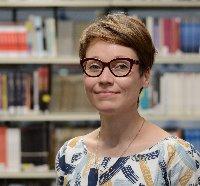Alexandra Mitchell is Archivist at the University of Salford. She attended IDCC 2020 with support from the DPC's Career Development Fund which is funded by DPC Supporters.
Being a first-time attendee at the IDCC Conference I didn’t know quite what to expect. With my background and experience firmly rooted within archives, most of the conferences I have attended have tended to be dominated by the archive profession. The opportunity to attend the IDCC Conference thanks to the DPC Scholarship fund was not only a refreshing change but highlighted just how much we can learn from those working in other sectors on the management, preservation, access and use of digital content. The conference would prove to be an interesting and dynamic few days.
Francine Berman’s opening keynote on ‘The Internet of Things: Utopia or Dystopia?’ anchored the conference in the context of the real-life impact of data curation. Francine talked about the world we live in and that we are all participants in ‘the internet of things’ (IoT) - a world increasingly dependent on devices that connect to the internet and operate by sharing data. Whether you wear a fitness tracker, use an iPhone or drive a car with parking sensors, many of us are immersed in IoT. However, the question for Francine is whether IoT will ultimately help or hinder us.
IoTs promise a lot of good. I work at an institution, the University of Salford, which is investing heavily in these technologies including the areas of robotics and autonomous vehicle (AV) engineering, that offer many social, economic and environmental benefits. However, the use of IoTs is not without its risks – neatly demonstrated by the question as to whether surveillance is a form of protection or an intrusion of privacy.
Francine used the example of AVs to discuss how we can measure whether we are moving towards utopia in the IoT. IoTs should be good for the environment and for society, and whilst the positive environmental impact of AVs seems straightforward there is still a great deal of research to be done as to whether AVs are ‘good’ for society. For example, there is the question around whether AVs are in fact safe, the answer to which depends on what data is collected and how it is managed. The example reinforced just how much further research and experimentation is needed in this area.
As a former student of history by training, I agree with Francine that it seems that we have been here before: as was the case with the ‘industrial revolution’ in the west, it can take time for society and politicians to respond to developments in technology by implementing laws and regulations to protect individuals. However, this assumes that there is an end point. Technology is always changing, and laws and regulations will need to adapt quickly to keep up.
It was a privilege to listen to Francine speak - coming from a background in computer science, Francine is a co-founder of the Research Data Alliance and has been recognised by the Library of Congress as a Pioneer in Digital Preservation. One of my reasons for attending the conference was to learn more about what other institutions are doing with respect to collaborating on digital preservation. The theme of this keynote was broader and was concerned with data management and open data more generally.
However, reflecting the theme of the conference, the idea of collaboration was very much at the heart of the keynote. Francine concluded that as the drivers of technology, it is in fact up to us as to whether IoTs are a force for good. Governments, business, academia and the public are all responsible for ensuring that IoTs promote public interest. Whilst she does map out the different roles of these groups – including the responsibility of individuals to question and check their privacy settings – I can’t help but think that there are more complicated power dynamics at work with business, government and academia often having different and conflicting agendas.
The Career Development Fund is sponsored by the DPC’s Supporters who recognize the benefit and seek to support a connected and trained digital preservation workforce. We gratefully acknowledge their financial support to this programme and ask applicants to acknowledge that support in any communications that result. At the time of writing, the Career Development Fund is supported by Arkivum, Artefactual Systems Inc., CAE Technology, Formpipe, Libnova, MirrorWeb and Preservica. A full list of supporters is online here.










































































































































